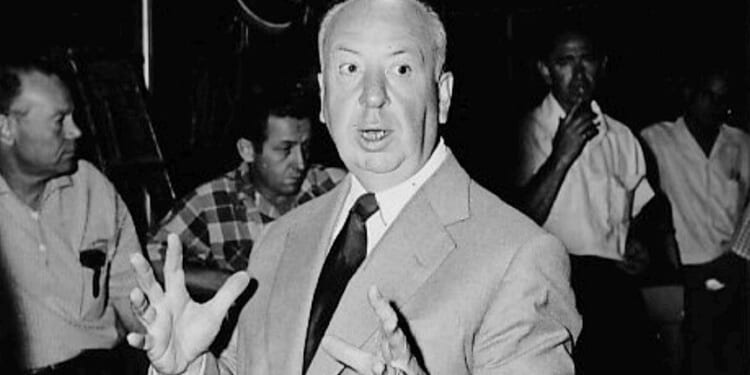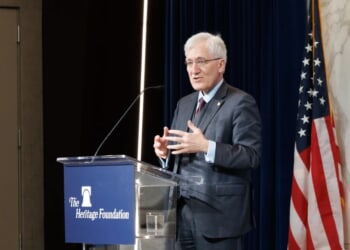Jonathan Cooper sneaks into the wings of the theater to tell acting student Eve Gill that his life is a mess. Not only has he helped his girlfriend Charlotte get away with murder, he says, but now a manhunt is underway: he’s wrongfully suspected of killing Charlotte’s husband.
That’s how Alfred Hitchcock’s Stage Fright (1950) launches into a wild ride, the besotted Eve (Jane Wyman) putting all her acting skills to the test to extricate Jonny (Richard Todd) from his dilemma, even pretending to be a maid so she can infiltrate the scene of the crime. Eve wants to believe that Jonny’s murderous lover, popular actress Charlotte Inwood (Marlene Dietrich), has pinned the crime on him. After all, he was spotted as he returned to Charlotte’s house for a new dress, since her outfit had a pool of blood on it after she killed her husband at home.
But the truth turns everything on its head.
Stage Fright certainly isn’t one of the best known of Hitchcock’s films, and it definitely isn’t my favorite among his work. It’s slower paced, and while the twist ending throws you for a loop, it’s not as satisfying as some of his other films. However, rewatching it this fall, for the first time in many years, I was fascinated by the theme of the story—the often overlooked value of the ordinary.
What’s in a name?
“Everything seems a fine acting role when you’re stage-struck.”
Eve’s whiskey-smuggling dad (Alastair Sim) might be a bit of a scoundrel, but these words to his daughter are right on point. Eve is “stage-struck,” arrested by Jonny’s bad-boy persona and willing to go to crazy lengths to protect him.
Eve gets herself hired as Charlotte’s maid in order to “get the dirt” on Charlotte as the true killer. With this accomplished, Eve reasons, Jonny can emerge from the shadows—and recognize his mistake in choosing Charlotte over her.
A wrench is thrown into Eve’s plans as she gets to know one of the detectives on the case, Detective Inspector Wilfred Smith (Michael Wilding)—nicknamed “Ordinary Smith.” Eve initially befriends him to stealthily get information on Jonny’s status with the police. However, she gradually finds herself pulled towards “Ordinary” and starts struggling to hide her collusion with Jonny.
What’s more, her safety might hang in the balance.
(SPOILER ALERT) Jonny has actually been feeding Eve lies: he killed Charlotte’s husband.
As I was watching, I was struck by the character’s names: Eve, Jonny, and Ordinary Smith. Hitchcock was Catholic, and although I’m not sure what the filmmakers originally intended, the characters’ names are intriguing through a Catholic worldview.
In the film, Eve craves the exciting and the over-the-top. Although she has good intentions (to save an “innocent” man), she strives to control a situation that quickly gets out of hand. This reminds me of the Eve of Genesis, wanting to “be like God” (Gen. 3:5) without having to rely on God. The funny thing is, stealing the fruit wasn’t necessary—Adam and Eve were “created…in [God’s] image” (Gen. 1:27). Just by living their ordinary lives, they were “like God.”
I think it’s interesting that in the movie, Eve has to choose between Jonny and Smith, two guys with common names. Jonny initially seems more exhilarating, but he’s a fake. Eve discovers a much more authentic and passionate connection with “Ordinary” Smith.
Bringing this back to the spiritual life, how many times do we go looking for the rush, only to feel let down like a sugar crash?
The story goes that St. Therese of Lisieux once longed to be a missionary, but then she discovered that the most mundane moments of the day can be just as important as heroic feats. As Jesus said, we should strive to be “faithful over a little” so God can “set you over much” (Mt. 25:21).
For Eve, Jonny’s way of stringing her along thrill by thrill just leads to heartache.
With Ordinary Smith, she gets the true thrills.
The “fourth deadly sin”
Have you ever thought about your “little sins” like Eve thinks about Jonny: “I could never hate you, Jonathan, because we’re such old friends”?
I’ll end my reflection with delving into one of Eve’s seemingly off-hand comments in the film. At one point, Eve jokes with Smith about the time she “played the fourth deadly sin” in a lackluster theatrical production. While watching, I wondered, what is the fourth deadly sin?
Afterwards, I searched the internet. The answer could be different based on what version you’re looking at, but Catholic Answers uses the acronym PEWSAGL for 1) Pride, 2) Envy, 3) Wrath, 4) Sloth, 5) Avarice, 6) Gluttony, and 7) Lust.
So, according to this numbering, Sloth is #4.
Until a few years ago, I didn’t have a firm understanding of what sloth is. I was pretty sure that being slothful was equivalent to being lazy, but that doesn’t get to the heart of things.
As Catholic Answers explains, “It wasn’t until the Protestant Reformers that sloth was viewed as physical laziness. For the Fathers as well as the medieval Doctors, sloth was being so busy that one didn’t make time for what was truly important. What is easier: to make a silent holy hour or to answer emails while talking on one’s cellphone?”
“This is why Thomas Aquinas defined sloth as an aimless ‘tendency to wander,’” they add. “It is the inability to care about the everyday routines of life and the demands of basic human existence.”
In other words, sloth can be about disregarding “Mr. Ordinary” in favor of Jonny.
In my own life, I began to recognize that I struggled with sloth, particularly in praying the Rosary daily. I had come to dread it to the point that I once told someone that I “hated” praying it. This fits in with how St. Thomas Aquinas describes sloth, “an oppressive sorrow, which…so weighs upon man’s mind, that he wants to do nothing.”
I could feel my dread for praying the Rosary pulling me away from God. However, I realized that part of the reason I dreaded it so much is that I kept procrastinating with praying it every day. Once I started praying the Rosary at a set time every day, I grew to see it as a natural rhythm in my life. Almost magically, I didn’t see it as something I had to do, but something I actually looked forward to. It also helped that I began praying alongside my family and friends in a prayer group.
What does all of this have to do with Stage Fright?
At the end of the movie, when Jonny finally admits to Eve that he is the murderer, he says he “can’t help it…I can’t control myself.” Jonny’s violence stems from mental illness, which of course comes with nuances in terms of his culpability.
However, if we’re looking at this from a more allegorical sense, indulging in sloth leads to a feeling of being trapped in a toxic cycle. Like Jonny’s feeling of helplessness, sloth leads to discontent and angry outbursts—like me as a high schooler, complaining that I hated praying the Rosary. Looking back, I can still feel the tightness and heat in my chest, the misery when I said those words.
On the flip side, we have the seemingly routine—the ordinary. You would think that creating a set time to pray daily would have made me feel more boxed in and angry. However, it did just the opposite—praying the Rosary in my prayer group led to feelings of freedom, lightness, and peace. I’m not going to lie and say I always feel like praying the Rosary, but it now feels like an indispensable part of my day, a practice that brings me peace.
This week, let’s agree to stop following the Jonnys. Let’s allow tried and true “Ordinary Smiths” to uplift us.
Image from Wikimedia Commons











